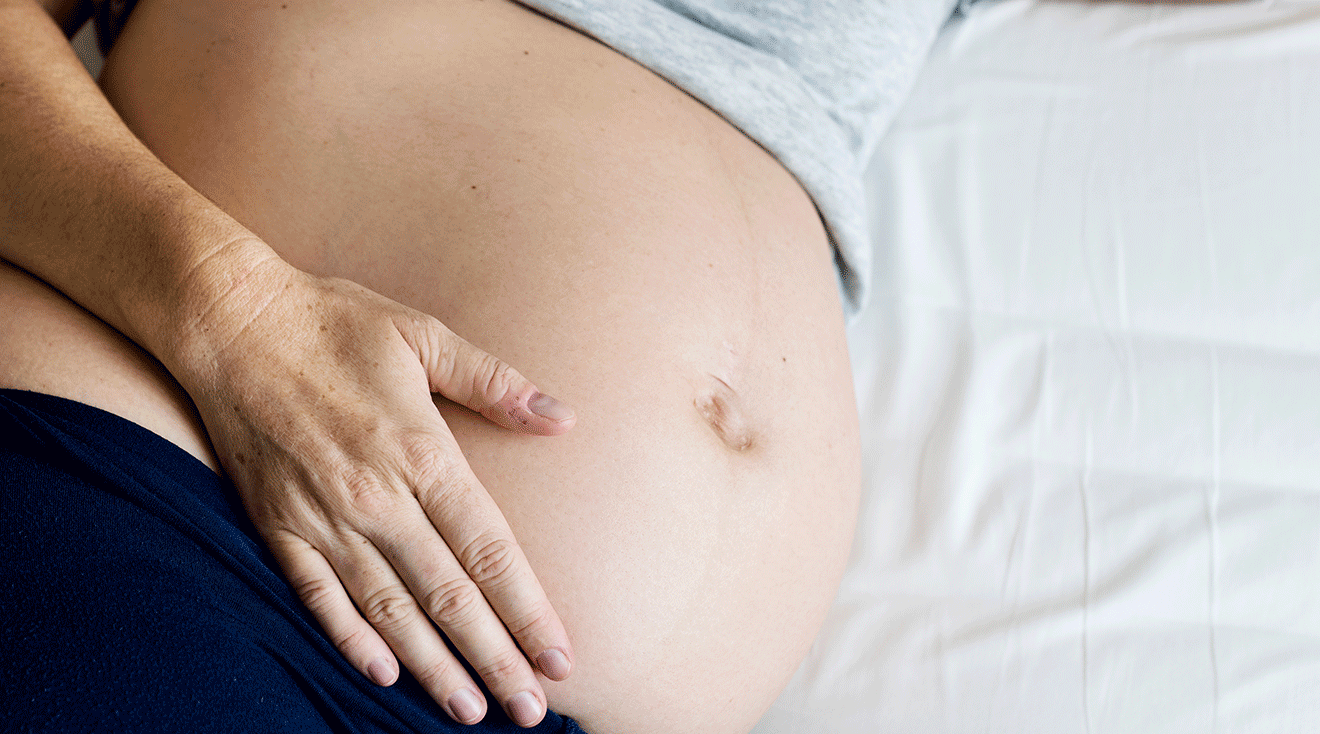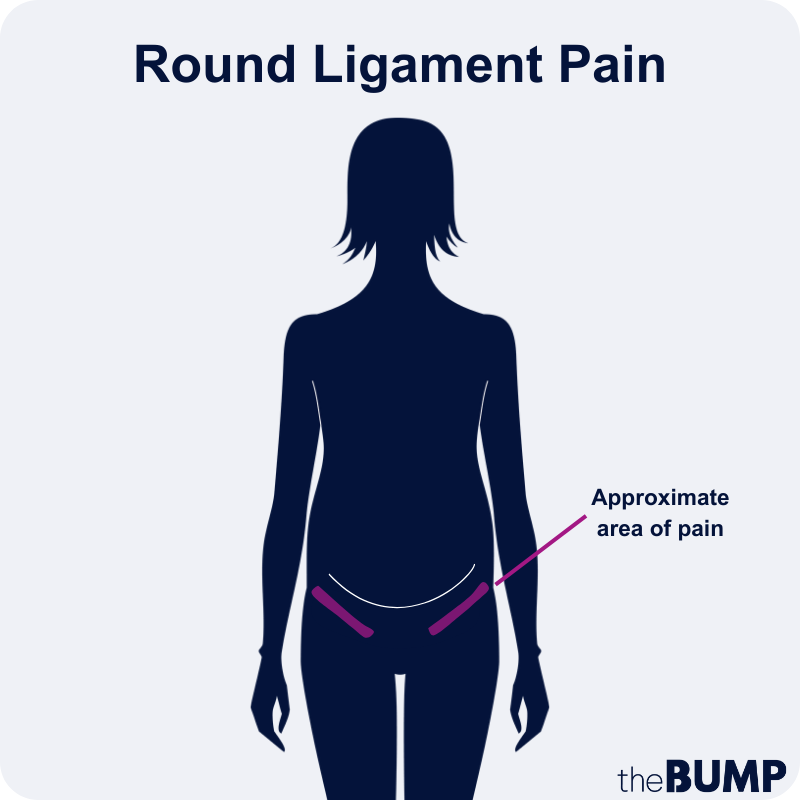What Round Ligament Pain Feels Like—and How to Find Relief
Oh, pregnancy: While it’s a journey that’s filled with lots of joy, it can also be fraught with lots of aches and pains. Round ligament pain, or the sharp sensation felt shooting from your lower abdomen into your groin, can be a major source of unpleasantness. The good news? It won’t last forever. The not-so-good news? You’ll probably have to wait it out in the meantime. The truth is: you might not be able to eliminate this pesky pain entirely, but you can take some steps to quiet your discomfort. Ready to get the lowdown? Read on to learn everything you need to know about round ligament pain, straight from the experts.
Round ligaments are rope-like structures that run from the top of each side of the uterus and insert into the groin, explains Kameelah Phillips, ob-gyn and founder of Calla Women’s Health in New York City. “This anatomy is important because when pregnant women have pain, they classically point along the direction of this ligament,” she adds. While these uterus-supporting ligaments typically contract and expand slowly, any sudden movement can make them contract quickly, causing momentary pain.
So how can you tell if the discomfort you’re feeling is round ligament pain—and exactly where do you feel round ligament pain? It typically feels like throbbing, pulling or shooting pain that runs from the side of your mid-abdomen and radiates down into the groin. And oddly enough, while these ligaments are present on both sides of the body, round ligament pain is more commonly felt on a pregnant person’s right side, explains Frederick Friedman, Jr., MD, an ob-gyn and director of obstetrics at Mount Sinai Health in New York City, adding that doctors aren’t quite sure why this is the case. Round ligament pain can happen at any time, but it’s often triggered by sudden or jerky movements like sitting up to get out of bed—or even sneezing. Strenuous activity or lots of movement can also contribute to round ligament pain, so you may need to slow down for a bit.
Round ligament pain vs. abdominal pain
Distinguishing between round ligament pain and abdominal pain can be difficult. Christine Greves, MD, FACOG, an ob-gyn at the Winnie Palmer Hospital for Women & Babies in Orlando, points to movement as a reliable indicator. “Round ligament pain comes with movement and can be intense and radiate to the groin.” Additionally, pain that resolves with rest or that’s only associated with position changes is more indicative of round ligament pain than abdominal pain.
If your pain is accompanied by nausea, vomiting or diarrhea; vaginal bleeding or fever, you’ll want to reach out to your doctor, advises Susan Crowe, MD, an ob-gyn at Stanford Medicine Children’s Health.
During pregnancy, the ligaments that connect your uterus to your groin get stretched as your uterus expands. This can lead to nerve spasms and shooting pains. In other words, round ligament pain is most often an uncomfortable but momentary reaction to sudden movement.
Round ligament pain often starts around the end of the first trimester or early part of the second trimester, when the uterus begins to push out of the pelvis. It typically doesn’t begin before the 12th week of pregnancy. But Crowe says that round ligament pain tends to start earlier with each subsequent pregnancy. It can also be more severe for people who’ve experienced abdominal surgery in the past, as scar tissue can be a bit less flexible.
Rest assured that round ligament pain is fairly short-lived, both in terms of how long each episode lasts and how long it continues during your pregnancy. When you get a shooting pain, it’ll usually only affect you for a few seconds or minutes. “Rarely does it last longer,” says Phillips, “although it can come and go.”
The intermittent pain will generally ease up a few weeks after it begins: It typically starts around 12 to 14 weeks as your bump starts to make its way out of the uterus, and can dissipate by 16 weeks, although sometimes the pain will last longer. “Although your uterus continues to grow after this, the fibers that caused the initial pain have already been stretched and probably no longer transmit pain,” Friedman explains.
Unfortunately, this is probably one of those things you’re just going to have to get through. (It doesn’t last forever—promise!) And while you can’t entirely prevent or stop round ligament pain, there are a few things you can do to help relieve it. First, stop doing whatever activity provoked the pain. If you were working out, it might be time to ease up. If you were getting out of bed, try rolling over and pushing up with your arms. Even bending over when you sneeze can help, Phillips says.
You can also try the following tips from experts and the American Pregnancy Association (APA) to help ease your round ligament pain:
- Change positions. Sometimes, a particular position can incite round ligament pain. Try slowly moving around a bit, and see if changing positions helps ease your discomfort.
- Prepare for sudden movements. Feel a sneeze or cough coming on? Prepare for these sudden movements by flexing your hips.
- Rest up. Sudden movements or vigorous activity can cause round ligament pain, so try slowing down, moving intentionally and giving your body a break, as needed. You’re working hard, so show yourself grace and kindness.
- Try gentle stretches. Feeling a lot of round ligament pain? A bit of gentle stretching or some prenatal yoga poses may help. Try putting your hands and knees on the floor and lowering your head to the ground while keeping your bottom up in the air, suggests the American Pregnancy Association.
- Get some extra support. Need a minute? Rest on your left side with a pillow under your belly for added support. You can also try a maternity belt—it may ease some of the pressure on your pelvis and ligaments.
- Take acetaminophen. You can also take acetaminophen to help get you through the discomfort. Of course, since episodes of round ligament pain are usually short-lived, you might try a few other options first.
- Try a warm compression. Applying localized warmth can provide relief from round ligament pain. (Just make sure the compress or heating pad isn’t hot.)
If you aren’t sure whether you’re experiencing round ligament pain or abdominal distress, pause what you’re doing and rest. Pay close attention to how your body feels and ask yourself a few questions: Does something seem to be triggering the pain? Is it continuous or periodic? A quick evaluation can help you determine if the discomfort you’re having is, in fact, round ligament pain.
If you’re experiencing what you chalk up to be severe or constant round ligament pain, call your OB. There’s a chance it’s not round ligament pain. Abdominal pain can be indicative of other pregnancy complications, including preeclampsia, placenta abruption or preterm labor. It could also be a symptom of something entirely unrelated to pregnancy. Again, you’ll also want to get checked out ASAP if the pain is preventing you from doing normal activities, or if it’s accompanied by other troubling symptoms, including:
- Nausea and vomiting
- Fever or chills
- Bleeding
- Difficulty walking
- Pain when urinating
- Lower back pain
- Intense pelvic pressure
- Regular and consistent contractions
Of course, pregnancy is trying on your body; it’s very possible you may just be experiencing round ligament pain or the regular aches and discomfort that come with growing a human. Still, it’s always a good idea to bring any discomfort to your doctor’s attention. “We like to know about anything that’s persistent,” Friedman says. “Sometimes it’s absolutely nothing to worry about, but we do want to know if there’s a complaint that’s ongoing.”
Plus, more from The Bump:
Susan Crowe, MD, is an ob-gyn at Stanford Medicine Children’s Health and clinical professor of Obstetrics and Gynecology in the Division of MFM/Obstetrics at Stanford School of Medicine.
Frederick Friedman, Jr., MD, is the director of obstetrics at The Mount Sinai Health System in New York City. He received his medical degree from SUNY Downstate Medical School in Brooklyn, New York.
Christine Greves, MD, FACOG, is an ob-gyn at the Winnie Palmer Hospital for Women & Babies in Orlando, Florida. She received her medical degree from the University of South Florida College of Medicine.
Kameelah Phillips, is an ob-gyn and the founder of Calla Women's Health in New York City. She received her medical degree at the University of Southern California Keck School of Medicine in Los Angeles.
American Pregnancy Association, Round Ligament Pain
Navigate forward to interact with the calendar and select a date. Press the question mark key to get the keyboard shortcuts for changing dates.





















































